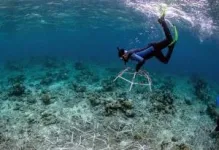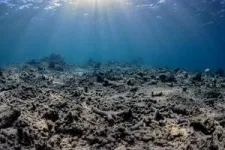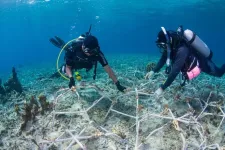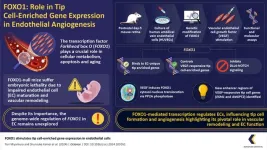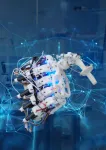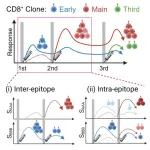(Press-News.org) While the majority of the world’s reefs are now under threat or even damaged potentially beyond repair, a new study reported in the journal Current Biology on March 8 offers some encouraging news: efforts to restore coral reefs not only increase coral cover, but they can also bring back important ecosystem functions, and surprisingly fast.
“We found that restored coral reefs can grow at the same speed as healthy coral reefs just four years after coral transplantation,” says Ines Lange (@InesLange9) of University of Exeter, UK. “This means that they provide lots of habitat for marine life and efficiently protect the adjacent island from wave energy and erosion.”
“The speed of recovery that we saw was incredible,” she says. “We did not expect a full recovery of reef framework production after only four years.”
The work by Lange and her international colleagues represents the first reef carbonate budget trajectories at any coral restoration sites. The study was conducted at the Mars Coral Reef Restoration Programme in South Sulawesi, Indonesia, one of the largest restoration projects in the world. The project relies on transplanting corals and adding substrate to restore reefs badly damaged by blast fishing 30 or 40 years ago. Without human intervention, those reefs had shown no signs of recovering due to the presence of loose coral rubble that prevents young coral larvae from surviving.
The restoration effort has added a continuous network of sand-coated steel structures to consolidate the rubble and offer a structure for transplanting coral fragments. The question was whether and how quickly such restored sites would recover. To find out, the researchers measured the carbonate budgets of 12 sites that had been restored at different times, up to four years ago.
“Corals constantly add calcium carbonate to the reef framework while some fishes and sea urchins erode it away, so calculating the overall carbonate budget basically tells you if the reef as a whole is growing or shrinking,” Lange says. “Positive reef growth is important to keep up with sea-level rise, protect coastlines from storms and erosion, and provide habitat for reef animals.”
They wanted to know how long it takes to bring back healthy reef growth and its associated functions. Their data show that rapid growth of transplanted corals supports the recovery of coral cover and carbonate production. In fact, just four years in, the net carbonate budget had tripled such that it matched that at healthy control sites.
There were some important differences, however. Because branched corals had been transplanted preferentially over other corals, the makeup of the restored reef communities differs. The researchers say those differences “may affect habitat provision for some marine species and resilience to future heatwaves, as branching corals are more sensitive to bleaching.”
While longer-term study is necessary to see what happens over time and under stress, the findings show that active management actions can help to boost the resilience of reefs and bring back important ecosystem functions that are critical for marine life and local communities in relatively short periods of time, according to the researchers. They’re hopeful that, over time, restored reefs will naturally recruit a more diverse mix of coral species. However, they note that what will happen in any given location around the world will depend on many factors, including environmental conditions and restoration techniques.
“As is so often the case, there is no one-size-fits-all solution, but we hope that this positive example can be used as inspiration for other reef restoration projects around the world,” Lange says.
“These results give us the encouragement that if we can rapidly reduce emissions and stabilize the climate, we have effective tools to help regrow functioning coral reefs,” says Tim Lamont (@TimACLamont), a study co-author at the Lancaster Environment Centre, Lancaster University, UK.
###
This work was supported by the Royal Commission, the Fisheries Society of the British Isles, and the Bertarelli Program in Marine Science.
Current Biology, Lange et al. “Coral restoration can drive rapid reef carbonate budget recovery” https://cell.com/current-biology/fulltext/S0960-9822(24)00151-9
Current Biology (@CurrentBiology), published by Cell Press, is a bimonthly journal that features papers across all areas of biology. Current Biology strives to foster communication across fields of biology, both by publishing important findings of general interest and through highly accessible front matter for non-specialists. Visit http://www.cell.com/current-biology. To receive Cell Press media alerts, contact press@cell.com.
END
When you teach a child how to solve puzzles, you can either let them figure it out through trial and error, or you can guide them with some basic rules and tips. Similarly, incorporating rules and tips into AI training—such as the laws of physics—could make them more efficient and more reflective of the real world. However, helping the AI assess the value of different rules can be a tricky task.
Researchers report March 8 in the journal Nexus that they have developed a framework for assessing the ...
Planting new coral in degraded reefs can lead to rapid recovery – with restored reefs growing as fast as healthy reefs after just four years, new research shows.
Reefs worldwide are severely threatened by local and global pressures. In Indonesia, where the study was carried out, destructive blast fishing destroyed large reef areas 30-40 years ago – with no signs of recovery until now.
The Mars Coral Reef Restoration Programme attempts to restore degraded reefs by transplanting coral fragments onto a network of interconnected ...
About The Study: In this study including 47,000 participants, continuous Medicaid eligibility during the COVID-19 pandemic significantly reduced loss of Medicaid after birth, suggesting similar uninsurance reductions may be expected from post-pandemic postpartum Medicaid extensions, which most states plan to implement.
Authors: Jamie R. Daw, Ph.D., of the Columbia University Mailman School of Public Health in New York, is the corresponding author.
To access the embargoed study: Visit our For The Media website at this link https://media.jamanetwork.com/
(doi:10.1001/jamahealthforum.2024.0004)
Editor’s ...
About The Study: This qualitative study including 25 interviews with Black patients discharged from the emergency department described these patients’ perspectives about racism in health care, recent clinical experiences, and thoughts on system improvements. Black patients described a notable amount of medical mistrust, anticipation of racism in emergency care, and personal experiences with clinical instances of racism in emergency treatment.
Authors: Anish K. Agarwal, M.D., M.P.H., M.S., of the University of Pennsylvania in Philadelphia, is the corresponding ...
Background and Aims
The impact of the characteristics of extrahepatic organ failure (EHOF) including the onset time, number, type, and sequence on the prognosis of acute-on-chronic liver failure (ACLF) patients remains unknown. This study aimed to identify the association between the characteristics of EHOF and the prognosis of ACLF patients.
Methods
ACLF subjects enrolled at six hospitals in China were included in the analysis. The risk of mortality based on the characteristics of EHOF was evaluated. Survival of study groups was ...
UVA Health researchers have received $2.8 million to advance their development of a high-tech way to save heart and dialysis patients from the need for multiple surgeries.
Researchers Lian-Wang Guo, PhD, and K. Craig Kent, MD, are pioneering a quick and gentle technique to “paint” tiny nanoparticles on transplanted veins to prevent the veins from becoming clogged in the future. This type of blockage often causes cardiovascular and dialysis patients to require repeated surgeries; approximately half of all heart ...
The human vascular system, a complex network of blood vessels, plays an essential role in maintaining health. Understanding the molecular mechanisms underlying vascular development is important for tackling age-related disorders. The Forkhead box O (FOXO1) transcription factor is crucial in processes related to aging, cellular metabolism, and apoptosis. Despite its significance, the comprehensive regulation of FOXO1 across the genome in endothelial cells (EC) has not been investigated.
In a new paper published in iScience in February 2024, a research team from Kumamoto University ...
Scope
For decades, robotic systems have played a pivotal role in nurturing the growth of tissue-engineered constructs in controlled environments through the provision of mechanical stimulation. The importance of physical stresses in tissue maturation is not only intuitive from our own bodily experiences but is also supported by a growing body of mechanotransduction research. However, experimental studies have predominantly remained confined to basic in vitro setups, hampering our ability to produce functional grafts that can translate into clinical practice. Emerging evidence suggests that replicating physiological stresses more faithfully could further enhance the functionality of tissue ...
mRNA vaccines developed against the spike glycoprotein of severe acute respiratory syndrome type 2 coronavirus (SARS-CoV-2), displayed remarkable efficiency in combating coronavirus 19 (COVID-19). These vaccines work by triggering both cellular and humoral immune responses against the spike protein of the virus. Cellular immunity may play a more protective role than humoral immunity to variants of concerns (VOC) against SARS-CoV-2, as it targets the conserved regions of spike protein and possibly cross-reacts with other variants.
Since a single spike epitope is recognized by multiple T-cell clones, the ...
Climate change is driving both the loss of biodiversity and the need for clean, renewable energy. It is also shifting where species are expected to live in the future. Yet these realities are rarely considered together. Where can clean energy projects be built without impacting the future habitat ranges of threatened and endangered species?
A study from the University of California, Davis, examines this question by overlaying renewable energy siting maps with the ranges of two species in the southwestern United States: the iconic and climate-vulnerable ...

